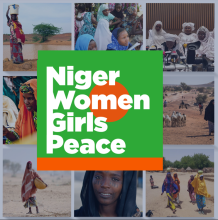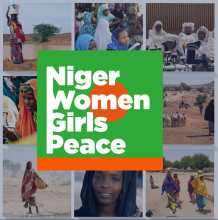Even before Niger’s political crisis this summer, an estimated 10.6 million people, or 41 per cent of the population, faced moderate to acute food insecurity. The National Council for the Safeguard of the Homeland took power on 26 July, and there are now more than 500,000 internally displaced people, 84 per cent of whom are women and children.
“This crisis threatens to ruin my business and drive me into food and financial insecurity”, said a woman identified as Hadiza, who makes a living importing clothes from Nigeria and spoke on a podcast aired as part of the women’s rights digital campaign “Niger Femmes Filles Paix” (Niger Women Girls Peace).
Women’s groups in Niger push for justice amid coup and economic crisis
Throughout the campaign, participants have highlighted the urgent need to protect women and girls from gender-based violence, to preserve gains in women’s rights, and to continue the provision of essential services, ranging from maternal and reproductive health care to water, and electricity.
“As a direct victim of this crisis, we appeal to the parties involved […] to take our rights into account”, Hadiza said.
The local rights group Femmes, Action et Développement (FAD) facilitated the Niger Femmes Filles Paix campaign, which launched on 5 September and has seen the participation of nearly 30 local women’s civil society groups.
Organizations connected with the African Women Leaders Network have also voiced their support for the women of Niger, and have lobbied West African authorities to reduce the suffering of women and children. Other active groups include the “Mouvement Pour le Respect des Droits des Femmes” (Movement for the Respect of Women’s Rights), facilitated by FAD, and the Network of African Women in Conflict Prevention and Mediation, or FemWise-Africa.
From 20 to 22 September, more than 100 participants, representing dozens of women’s rights groups throughout Niger, gathered to host a dialogue on the country’s political situation. Organized under the “Movement for the Respect of Women’s Rights in Niger” banner, the activists called for regional parties as well as local political, traditional, and religious leaders, as well as the de facto authorities, to continue to safeguard the rights of women and children, and to facilitate meaningful inclusion of women in all political processes.
Before the coup, women’s participation in parliament was 30.72 per cent. With the National Assembly and state institutions now dissolved, the implementation of progressive provisions such as the quota law that improved women’s representation in parliament is uncertain.
“Since the coup d’état, I have noticed a certain deterioration of my rights as a woman”, said a young activist identified as Rachida, who spoke on a podcast organized as part of Niger Femmes Filles Paix.
“Women must be put at the forefront of any question that concerns peace, dialogue, and social cohesion, because they are an important pillar of society”, she said.

